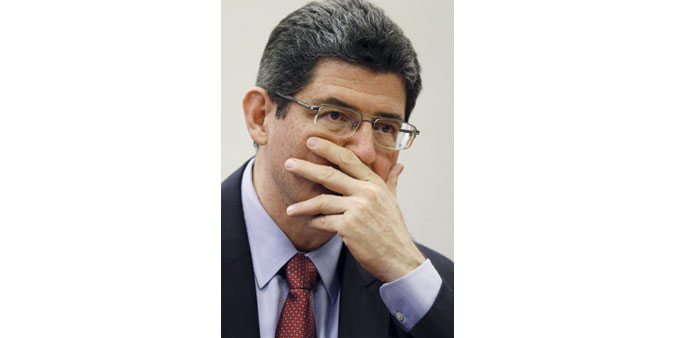Reuters/Brasilia
The Brazilian government dismissed market rumours that Finance Minister Joaquim Levy was quitting because of disagreements over his austerity plan.
Brazil’s currency rebounded from 12-year lows on news that Levy was staying in the job and attending a budget meeting with President Dilma Rousseff.
Levy, an orthodox economist who enjoys the trust of financial markets, cancelled a trip on Thursday to the Group of 20 summit in Turkey to attend the last-minute meeting, on the 2016 budget bill. His office later said he would attend the summit, which started yesterday.
“Levy is a valuable minister in this administration who cancelled his trip abroad to attend an important budget discussion,” the Institutional Communications minister, Edinho Silva, told Reuters, adding that Levy continued to lead the government’s macro-economic strategy.
Speculation about Levy’s departure was not discussed at the meeting, Rousseff’s chief of staff, Aloizio Mercadante, told reporters.
In an interview published online by El Pais, Levy said to the Spanish newspaper: “I have no intention of leaving the government.” The local currency had fallen as much 1.5% against the dollar after newspapers Folha de S.Paulo and Valor Economico reported that Levy was isolated and frustrated by a budget bill submitted on Monday.
Fiscal revenue has plummeted as Brazil’s economy enters a severe recession, complicating efforts led by Levy to plug a widening fiscal gap that has undermined the credibility of Rousseff’s administration among investors.
The budget bill, sent to Congress on Monday, was Brazil’s first ever to forecast a primary deficit, highlighting Levy’s failure to shore up federal accounts to save the country’s investment-grade rating.
Planning Minister Nelson Barbosa, who has gained influence in economic policy as Levy’s austerity agenda makes enemies in Congress and other ministries, has defended the deficit projection in recent days as a sign of transparency and realism.
In a television interview late Thursday, Barbosa said that while there is a small nominal increase in discretionary spending, inflation has eroded the value of that spending.
“After adjusting for inflation the budget will buy fewer goods and services than it did in 2012,” Barbosa said.
Levy, a University of Chicago-trained economist, disagreed with Rousseff’s decision to propose a budget for next year with a deficit. He argued for deeper cuts in public spending.
Barbosa denied that Levy was sidelined.
“In the budget process there will always be disagreements,” Barbosa said. “But in the end it was a collective effort.”
The final decision was Rousseff’s, Barbosa added.

